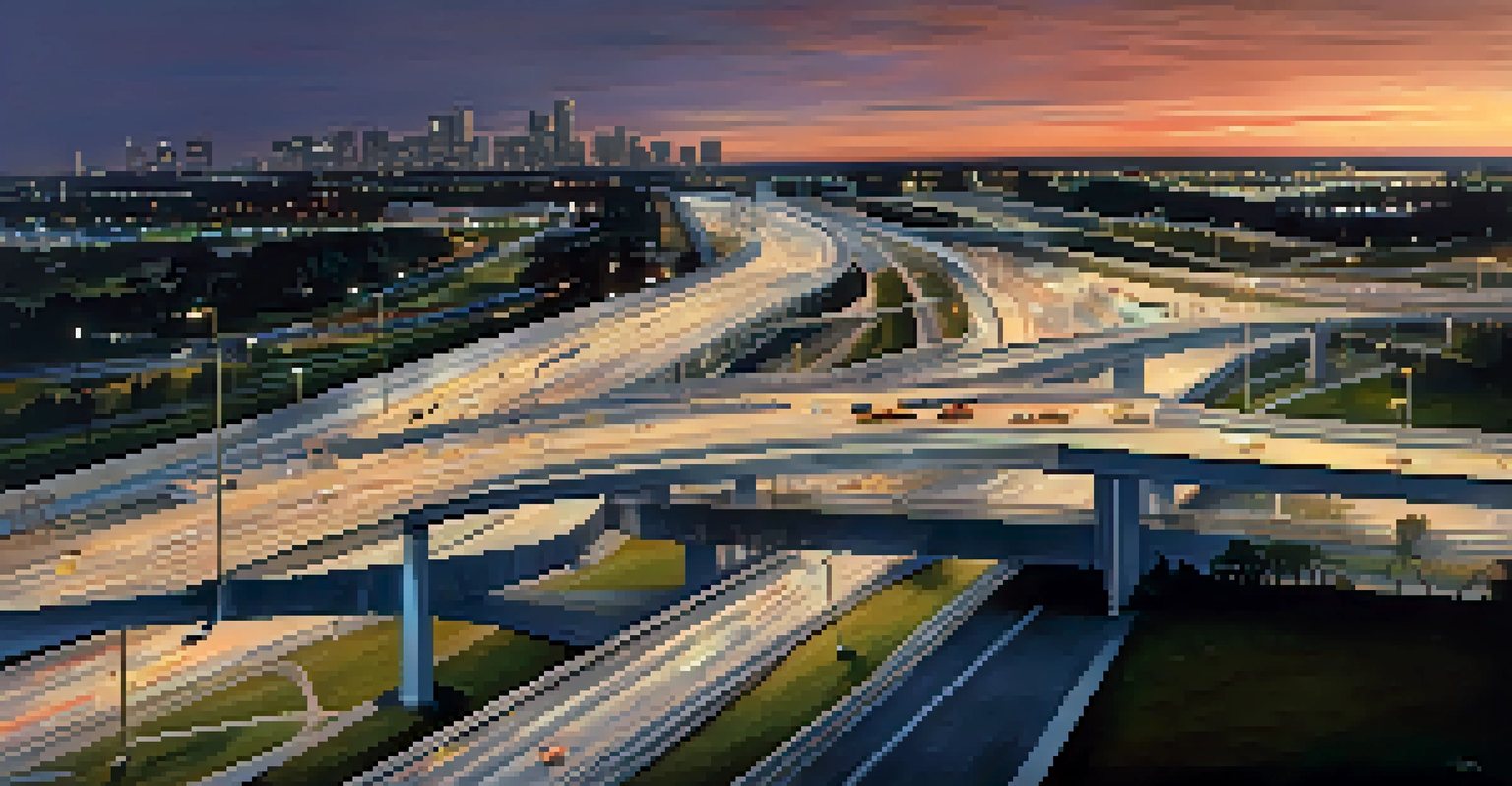Recent Developments in Jacksonville's Road Infrastructure

Overview of Jacksonville's Road Infrastructure Updates
Jacksonville, known for its sprawling landscapes and vibrant communities, has been making significant strides in improving its road infrastructure. Recent developments focus on enhancing traffic flow and safety for residents and visitors alike. These improvements are essential for a city that sees a steady influx of people and vehicles, making efficient transportation a top priority.
Infrastructure is the backbone of a thriving economy, and investing in it is crucial for our future.
The city's Department of Transportation has rolled out various projects aimed at upgrading existing roads, adding new lanes, and improving signage. This approach not only aims to reduce congestion but also provides a smoother driving experience. By investing in modern infrastructure, Jacksonville is better positioning itself for future growth and accessibility.
Moreover, these updates are not just about expanding roads; they're also about integrating technology. Smart traffic signals and real-time traffic monitoring systems are being implemented to create a more responsive transportation network. This tech-savvy approach ensures that the city's infrastructure can adapt to changing traffic patterns and commuter needs.
Key Projects Underway: Enhancements and Upgrades
One of the most talked-about projects is the expansion of the I-295 interchange, which aims to alleviate bottlenecks and improve connectivity. This project includes the addition of new lanes and the redesign of key intersections, which are crucial for daily commuters. When completed, this expansion is expected to enhance travel times significantly.

In addition to the I-295 project, several neighborhood roads are receiving much-needed attention. The city is investing in resurfacing and repairing roads that have suffered from wear and tear over the years. These upgrades not only improve driving conditions but also enhance the overall aesthetic of the neighborhoods, making them more appealing for residents and businesses alike.
Jacksonville's Road Upgrades Boost Safety
The city is enhancing its road infrastructure with new lanes, smart signals, and improved signage to ensure safer and smoother travel for all.
Furthermore, pedestrian and cyclist safety has been a major focus in recent infrastructure developments. New bike lanes and sidewalks are being constructed to encourage non-motorized transportation. This commitment to creating a multi-modal transportation network reflects Jacksonville's goal of being more inclusive and environmentally friendly.
The Role of Community Feedback in Infrastructure Plans
Community involvement has been pivotal in shaping Jacksonville's road infrastructure projects. The city has been actively soliciting feedback from residents through public forums and online surveys. This engagement ensures that the needs and concerns of the community are taken into account when planning and executing projects.
Community engagement is not just a process; it's a catalyst for positive change in our neighborhoods.
By listening to the voices of the citizens, city planners can better understand the specific challenges faced by different neighborhoods. For instance, input from local businesses has led to adjustments in project designs that prioritize accessibility and customer traffic. This collaborative approach fosters a sense of ownership among residents, making them feel invested in the improvements being made.
Moreover, community feedback can highlight areas that may be overlooked in initial plans. By incorporating suggestions from the public, Jacksonville can create a more comprehensive infrastructure strategy that benefits everyone. This two-way street of communication strengthens the relationship between the city government and its citizens.
Environmental Considerations in Road Development
As Jacksonville invests in its road infrastructure, environmental sustainability has become a crucial consideration. The city is exploring eco-friendly materials and practices to minimize the ecological impact of construction. For example, using recycled materials in road resurfacing not only reduces waste but also conserves natural resources.
Additionally, projects are being designed with green spaces in mind. Incorporating trees, landscaping, and stormwater management systems helps to mitigate urban heat and improve air quality. These measures highlight Jacksonville's commitment to balancing development with environmental stewardship.
Community Input Shapes Infrastructure
Active community engagement is influencing Jacksonville's infrastructure projects, allowing residents to voice their needs and contribute to more effective planning.
Furthermore, the integration of public transport and bicycle lanes aims to reduce reliance on cars, contributing to lower carbon emissions. By promoting alternative modes of transportation, Jacksonville is paving the way for a greener, more sustainable future.
Impact on Local Economy and Businesses
The upgrades to Jacksonville's road infrastructure are set to have a positive ripple effect on the local economy. Improved traffic flow and accessibility can attract new businesses and encourage existing ones to expand. When customers have easier access to stores and services, it can lead to increased foot traffic and sales.
Moreover, construction projects themselves create jobs and stimulate economic activity. Local contractors and suppliers benefit from the influx of work, which can bolster the economy during the construction phase. This boost is especially significant in a city like Jacksonville, where job creation is vital for ongoing growth.
In the long run, a well-connected infrastructure can make Jacksonville a more attractive destination for tourists and residents alike. As the city continues to develop its roadways, the potential for economic growth becomes even more promising.
Challenges Faced During Infrastructure Development
Despite the positive aspects of Jacksonville's infrastructure projects, challenges are inevitable. One of the primary concerns is funding; securing the necessary financial resources can be a complex process. The city must navigate various budgets, grants, and public-private partnerships to bring projects to fruition.
Additionally, construction can lead to temporary inconveniences for residents and commuters. Road closures and detours might frustrate daily routines, but city officials are working hard to minimize disruptions. Clear communication and signage play a crucial role in keeping everyone informed about the progress and any changes in traffic patterns.
Sustainability in Road Development
Jacksonville is prioritizing environmental sustainability by using eco-friendly materials and promoting alternative transportation to reduce its ecological footprint.
Lastly, unexpected issues such as weather conditions or supply chain delays can hinder project timelines. Flexibility and adaptability are essential in overcoming these obstacles, ensuring that Jacksonville's infrastructure improvements stay on track as much as possible.
Future Vision: Long-Term Goals for Jacksonville's Roads
Looking ahead, Jacksonville has ambitious plans for its road infrastructure that extend beyond immediate upgrades. The long-term vision includes creating a more integrated public transportation system that connects various parts of the city seamlessly. By improving accessibility, the city aims to enhance the quality of life for all residents.
Moreover, there's a concerted effort to incorporate smart technology into future developments. This includes traffic monitoring systems that can adapt in real time to changing conditions. By embracing innovative solutions, Jacksonville is preparing itself for the transportation challenges of tomorrow.

Ultimately, the goal is to create a road network that not only meets current demands but also anticipates future needs. As Jacksonville continues to grow, its infrastructure must evolve in tandem, ensuring that the city remains a vibrant and accessible place for all.